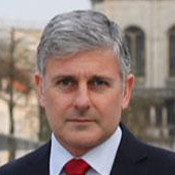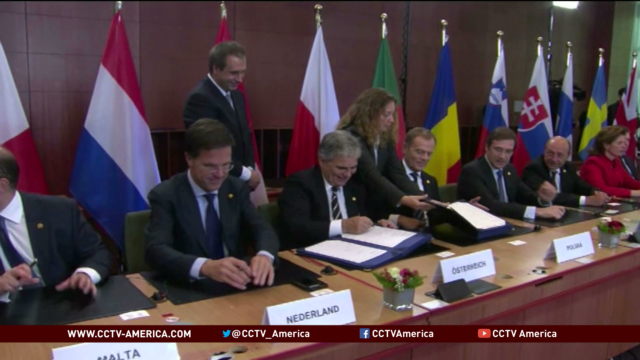In Brussels, Ukrainian president Petro Poroshenko signed a landmark trade agreement with the European Union, drawing immediate threats of economic backlash from Moscow. Also, a feud ensued over the nomination of Luxembourg’s former leader as European Commission President. CCTV’s Jack Barton reports.
The same trade agreement was rejected by Ukraine’s former president, which lead to his ouster, the loss of Crimea to Russia, and an ongoing armed conflict.
The agreement ends about 98 percent of E.U. tariffs on Ukrainian exports and in return, Ukraine is expected to align its institutions to E.U. standards, mainly in the form of decreasing corruption. Georgia and Moldova signed similar deals with the E.U., ultimately allowing access to the E.U.’s market of 500 million citizens.
Moscow has responded to the signings out of fear of losing influence over former soviet republics. Almost immediately after the signings, Russia’s state-controlled energy giant Gazprom warned that it could limit supplies to countries that intend to re-sell the fuel to Ukraine.
In addition to the free trade deals, there was bitter infighting in Brussels over the nomination of Luxembourg’s former prime minister Jean Claude Junker as the next European Commission president.
British Prime Minister David Cameron warned that the appointment would raise anti-E.U. sentiment.
“Jean Claude Junker has been at the heart of the project to increase the power of Brussels and to reduce the power of nation states his entire working life. He’s not the right person to take this organization forward.”
Junker’s appointment is expected to sail through the European Parliament on July 16. According to Britain and Hungary, it was the Parliament that forced the selection of Junker on the E.U.

Brussels: Ukraine signs landmark deal, feud over nominee for top E.U. position
In Brussels, Ukrainian president Petro Poroshenko signed a landmark trade agreement with the European Union, drawing immediate threats of economic backlash from Moscow. Also, a feud ensued over the nomination of Luxembourg's former leader as European Commission President. CCTV's Jack Barton reports.For a closer look at these events in Brussels, Washington correspondent for Europolitics Brian Beary joined CCTV’s Jessica Stone.

Brian Beary on the latest from Brussels
For a closer look at the events in Brussels, Washington correspondent for Europolitics Brian Beary joined CCTV's Jessica Stone.Moscow has warned it may scale back trade ties with Ukraine, Georgia, and Moldova out of fears that the E.U. will force Ukraine to choose between the two key economic partners. CCTV’s Daria Bondarchuk reports from Moscow.
Russian president Vladimir Putin was quoted as referring to the revolution in Kiev as an attempt “to force on the Ukrainian people an artificial choice between Europe and Russia.”
Russian experts say the move is largely symbolic as an aim to anchor Ukraine in Europe’s geopolitical orbit, but the E.U. maintains that the deals will not prevent the three states from keeping ties with Russia. Russian experts also say the states will not benefit from opening their markets to Europe because their local producers are less competitive.
Pro-E.U. Ukrainian authorities view the signing of the deal as a victory. This comes about one year after they came to power after protesting against the former president’s decision to abandon the same deal in favor of stronger ties with Russia.
In terms of export bans from Moscow, Ukraine is likely to face consequences that could potentially cost hundreds of billions of dollars worth of trade with Russia.

 CGTN America
CGTN America

